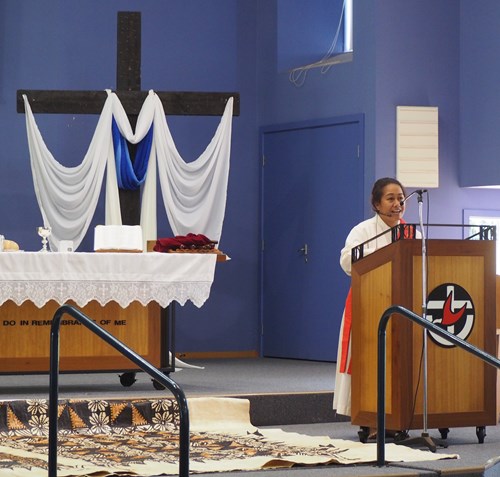Rev Lofa Anga’aelangi induction response
29 Feb 2020 by Rev Lofa Anga’aelangi in: Latest NewsFollowing is the text from Rev Lofa Anga’aelangi's response at her induction on 29 February 2020.
I was born in Tonga, also baptised in the Free Wesleyan Church of Tonga (Methodist). My family and I migrated to Australia when I was 9 years old.
Growing up in Tonga, I was like every other child who was curious about a lot of things especially God and what is our relationship as a church. I believe what made things more interesting was growing up in a country, governed by a monarch. My inquisitive mind was burning to know why the royal family were so special compared to the rest of us commoners. Why is it called a choice of duty to serve those at the top of the hierarchy, but it seems more of an obligation? If we are all created in the image of God, how is it that some are treated different to others? So many questions that got a lot of hush hush and some were ignored or told to stop asking before you get thrown to the ‘umu’ – also known as the underground oven.
Being raised and nurtured in Methodist in Tonga had its ups and downs. The strong singing, prayerful life, waking up at 5am to attend Wednesday and Friday morning services before school. Because the worship service was only less than 5-minute walk from our house. Sunday School started at 1pm until 2pm. I loved the syllabuses because there was a lot of character studies and we also got to play them at a special service in May.
Then we moved to Australia we lived four suburbs from our place of worship. We attended worship only once a week, sometimes we would try to be at the evening services during the week. There were also the choir practices on Saturday. Our family life was centred on doing church activities and being with our own community. At the time we didn’t have a vehicle but there were no complaints. In all of this my curiosity continued to be with me. I held on to the questions of seeing inequality everywhere I went in this new place. Some of the things we were doing as church perplexed me to look at other places. I mean is this all there is to being the church? Singing and praying every week, playing the role of Ruth or Mary or Gabrielle during Easter. In fact, there was always a longing to be more practical rather than just the reflective and prayerful life.
I believe that the questioning of inequality is a gift to call the church to be accountable for those at the margins and my call to ordination sits within it that place.
For a long time, I avoided discerning God’s call and so I worked in the youth as a secretary, treasurer, Sunday School teacher … they are important roles to the body of Christ. However, I was using those roles as a way of escaping the call to the ministry of the ordained. The fire to be a prophetic voice in the scattered community and making its connection with the church was still there.

In the end of 2010, I attended the NCYC, I was able to talk to some key people and leaders who were prepared to walk alongside me in discerning my call. It was the call to ministry of the ordained that I struggled with. The question of whether they are part of that ‘hierarchical system’ that worried me. It was during that time of discernment I came to realise the call was a way of life. It is, about being of service to others, to use my gifts for the mission of God’s. I always felt a strong call to the community at the margins, or the places where you hear people’s stories of struggle, issues of inequality, and that becomes a social issue for the church to seek justice. Which is why my interest in Biblical interpretations (hermeneutics) because I look for the voices that are silent in scripture. Identify the characters that are oppressed and have been profiled as some sort of villain. As readers it is our responsibilities to revisit the stories we think we already know and see the humanity of those characters that are demonised and align them with the image of God. And of course, others may have different approaches in making a difference. For the good news is found and actioned everywhere we look.
Lastly, I believe that the servanthood of Jesus Christ and his teachings are more than enough to bring about change in the status quo of any society.
I have been asked many times about the role of the deacon. The deacons focus on the scattered community and its connection to the church. At the same time, it is a part of our call to ensure and remind the church to be accountable for the good news of Jesus Christ. My thoughts on the accountability of the church and the call to the ministry of Deacon is to be more practical and available in our service to the ‘other’. Indeed, there is a time to be prayerful, reflective, and planning missions. Nevertheless, I don’t claim exclusiveness with regards to the ministry of deacon and their role in the church. The ministry of deacon means our focus on the scattered community is servanthood and also being the prophetic voice of the church for those at the fringes and to bring those social issues to the church.
I believe the questioning I had in my early childhood regarding inequality has been a part of my call to seek justice for all. And together with the good news of JESUS CHRIST they continue to shape, frame and challenge me in my call to the Ministry of Deacon.